
English (959)
Children categories
Experts call for urgent Action to address Malnutrition
05 September 2013, Dhaka. Nutrition experts, healthcare providers and others concerned at a discussion on Wednesday stressed urgent action to address the country's current malnutrition situation.
BRAC, a non-government organization, arranged the event at BRAC Centre, chaired by Sir Fazle Hasan Abed, its founding chairperson.
At the discussion titled 'Scaling up nutrition: An urgent call for commitment and multi-sectoral action', Sir Fazle said a combined approach is essential to address the issue. A strong focus on nutrition education and promotion by the highest government authority of the movement called Scaling Up Nutrition, SUN in short, should be integral part of the combined approach, he added.
'BRAC has been working in the nutrition sector for many years. However, the progress Bangladesh has so far made is not enough,' he remarked.
Kaosar Afsana, director of BRAC Health, Nutrition and Population Programme , gave the welcome speech at the discussion also addressed, among others, by Dr Tahmeed Ahmed, director of Centre for Nutrition and Food Security, ICCDR,B, Sarah Cook, head of DFID, Dr Rukhsana Haider, chairperson of Civil Society Alliance for SUN, Nasima Begum, additional secretary of the government social welfare department. Representatives from UNICEF, WHO, FAO, EU and World Bank were also present.
'We cannot accept that 53,000 children die each year from preventable complications resulting from chronic malnutrition,' said Dr Kaosar Afsana. She also emphasized cost-effective interventions to address the issue.
Dr Rukhsana Haider called for including nutrition components in development interventions in the country.
The speakers also viewed that knowledge sharing, collaboration and multi-ministry-based approach can highly contribute to addressing the issue.
600 Women drivers to be trained by BRAC
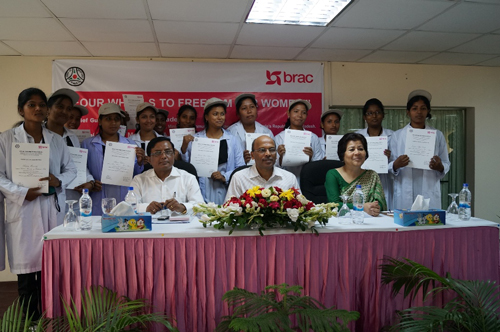
01 September 2013, Dhaka. BRAC, in collaboration with Bangladesh Road Transport Authority (BRTA), arranged an event named “Four Wheels to Freedom for Women” to discuss the issues relating to the employment opportunities of its woman drivers coming out of the BRAC Driving School. The event was also organised to mark the certificate giving ceremony of 15 freshly graduated women drivers from the school. The event took place at Uttara BRAC Learning Centre, in Dhaka.
BRAC Driving School, a part of BRAC’s Road Safety programme, started out in May 2012 as an institution to create trained drivers and qualified trainers for the roads of the country. In September 2012, BRAC Driving School, in partnership with BRTA, started the project- “Women Steering Forward” to create 600 trained women drivers. 75 of them have completed their training but only 18 of them have been employed so far.
Among the special guests of the event were, Ms. Rokiya A. Rahman, adviser to the former caretaker government and member of the BRAC Governing Body and Mr. Md. Nazrul Islam, Chairman, BRTA. The event was chaired by Mr. S N Kairy, Chief Financial Officer, BRAC & BRAC International.
The event started with a presentation by the Director of BRAC’s Road Safety programme, Mr. A. Najmul Hussain. He mentioned that, we have a severe shortage of skilled and properly trained drivers in our country; maintaining the quality of training in driving schools is also a very important issue. He was of the opinion that if a portion of the car registration fees can be spent in training the drivers then everyone would benefit from it.
One of the special guests, Ms. Rokiya A Rahman shared few of her experiences of driving in the streets among men. She stated that, “Women are not to be held back, the event today is a proof of that.”
Mr. Md. Nazrul Islam noted that, 15 percent of the driving jobs in the government pool are reserved for women drivers; but they (BRTA) do not receive any applications from the women drivers.
The Chair of the event, Mr. S N Kairy, said that BRAC is spending approximately 80,000 BDT for each of these graduates but they should have ample opportunities of employment after they graduate. He called the corporate sector for action in this matter by employing women drivers in their organisations. He also mentioned that, there are plans to send these drivers abroad for employment when the time is right.
All 15 of the women drivers who graduated from the 4th batch of BRAC Driving School received certificates from the special guests of the event.
A New Vision for seven million people in 10 City Corporations
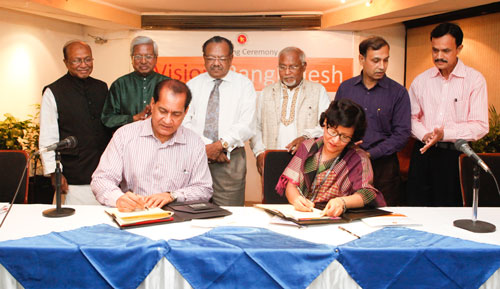
04 August 2013, Dhaka. BRAC and National Eye Care- Directorate General of Health Services (NEC-DGHS), Ministry of Health and Family Welfare have launched the second phase of the eye care project- Vision Bangladesh. The launching ceremony was held on the 4th August, 2013 at BRAC Centre auditorium.
In two and a half years of Vision Bangladesh Phase-I, about 95 per cent of the target of 100,000 cataract surgeries and 200,000 refractive error corrections have been achieved. Moreover, with the aid of frontline community health workers, BRAC has been able to deliver eye care at the doorstep of one million people across Sylhet division.
Based on the enormous success of that partnership and lessons learned in operating in rural areas, BRAC is now going to expand the eye care services in the slums of 10 city corporations of Bangladesh, covering an estimated 7.25 million people.
This project, which will run from July 2013 to December 2015, is aligned with Bangladesh Government’s national goal of eliminating avoidable blindness from Bangladesh by 2020.It will be implemented through a partnership approach and will foster collaboration between BRAC, NEC-DGHS, and other partner organizations including NGOs and hospitals. This project will develop capacity of the eye care providers and institutions; deliver eye care services and establish and sustain referral networks between the slum community and functional government hospital/private/NGO facilities for eye care.
Prof. Dr. A.F.M Ruhal Haque MP, Honourable Minister, Ministry of Health & Family Welfare (MoHFW), attended the ceremony as the Chief Guest. Prof. Syed Modasser Ali, Advisor to the Honourable Prime Minister for Health and Family Welfare and Dr. Capt. (Rtd.) Mozibur Rahman Fakir MP, Honourable State Minister, MoHFW, attended as Special Guests. The event was chaired by Sir Fazle Hasan Abed, Founder and Chairperson, BRAC.
The Minister said, “The effective leadership in National Eye Care and BRAC’s widespread network of frontline community health workers would equate to the certain success of this project.”
Prof. Syed Modasser Ali pointed out that the immense success of Sir Fazle in implementing a diverse range of development projects is the indicator that this project will also be a success.
Sir Fazle Hasan Abed said, “BRAC and Ministry of Health and Family Welfare have been involved in a number of partnerships for a long time to provide a range of healthcare services, including eye care.” He emphasised on scaling up Vision Bangladesh project across the country to eliminate cataract backlog by 2020.
A memorandum of understanding was signed by Dr. Prof. Deen Md. Nurul Huq, Line Director, National Eye Care and Director cum Professor NIO&H and Dr. Kaosar Afsana, Director, Health Nutrition and Population Programme, BRAC.
BRAC University offers fully-funded residential diploma on midwifery programme
BRAC University is offering Diploma in Midwifery in collaboration with implementing partner organisations in respective areas of Dhaka, Dinajpur, Cox's Bazar, Khulna, Mymensingh and Sylhet. The Diploma in Midwifery Programme is a 155-credit, full-time, 36-month residential programme taught by experienced faculties trained by Jhpiego and Liverpool School of Tropical Medicine and OGSB.
BRAC University is admitting students to its three year residential Diploma in Midwifery programme with generous scholarships. Interested students may apply online via bracu.ac.bd/apply or call 880 172620726 for further information. Deadline for application is August 18, 2013.
Millions of mouths to feed? He did it.
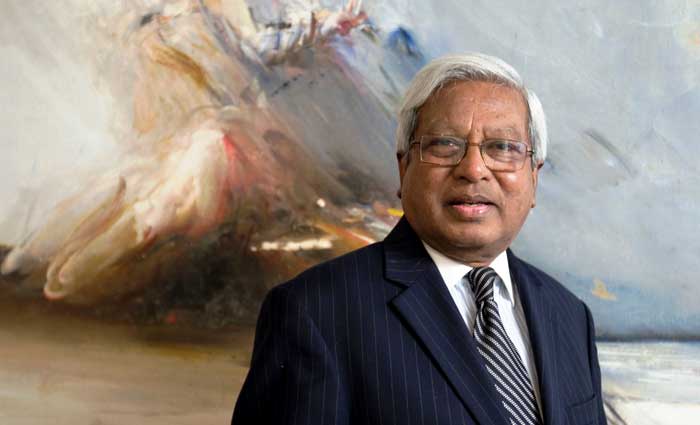
Bangladeshi poverty fighter Fazle Abed is the winner of the 2015 World Food Prize. (Courtesy photo)
Sometimes called the “Nobel Prize for food and agriculture,” the World Food Prize recognizes people who have made breakthrough contributions towards improving the world’s food supply. This year’s winner is a former accountant from Bangladesh.
Sir Fazle Hasan Abed, knighted for his work by the British crown, founded BRAC (formerly known as Bangladesh Rural Advancement Committee) in 1972 following Bangladesh’s devastating cyclone and war of independence. More than 40 years later, BRAC has helped nearly 150 million people out of poverty.
Focus on women and children
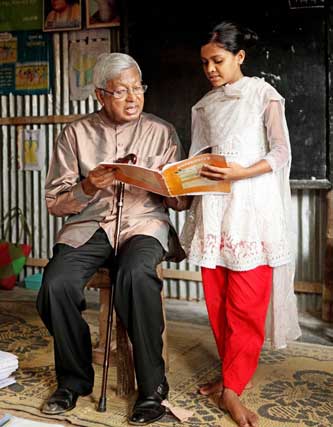
Beyond supporting a range of businesses, including fish hatcheries, tea plantations and milk processing centers, Abed has made it his business to help women in rural villages. They learn modern farming techniques, such as how to efficiently apply fertilizer to crops. Abed established programs that have enabled millions to disburse more than $1 billion through microfinance organizations. The loans have allowed women to create small, sustainable businesses producing iodized salt or raising cows, along with dairy and poultry farming.
BRAC’s innovations helped cut Bangladesh’s child mortality rate from 25 percent to 7 percent. How? Abed trained women to teach others how to mix a solution of water, salt and sugar — a combination that prevents dehydration. Instructors’ wages were based on how well households understood this lesson, in essence making this effort one of the world’s earliest incentive-based social entrepreneurship programs.
“Only by putting the poorest, and women in particular, in charge of their own destinies, will absolute poverty and deprivation be removed from the face of the earth,” Abed said after he learned of his nomination for the award.
Take Christina John, a farmer in Dodoma district in Tanzania. As a result of the vegetable seeds and field management lessons she received from BRAC, which began operations in the large East African nation in 2006, her income increased fourfold. She now earns enough money to send her children to school.
Feeding millions
Today, BRAC operates in Bangladesh and 10 other countries in Asia, Africa and the Caribbean, reaching an estimated 135 million people.
“At a time when the world confronts the great challenge of feeding over 9 billion people,” said World Food Prize President Kenneth Quinn, Abed and BRAC “have created the pre-eminent model being followed around the globe on how to educate girls, empower women and lift whole generations out of poverty.”
U.S. Agriculture Secretary Tom Vilsack said that “Sir Fazle’s and his organization’s recognition that engaging women in STEAM fields — science, technology, engineering, agriculture and math — benefits our local and global communities.”
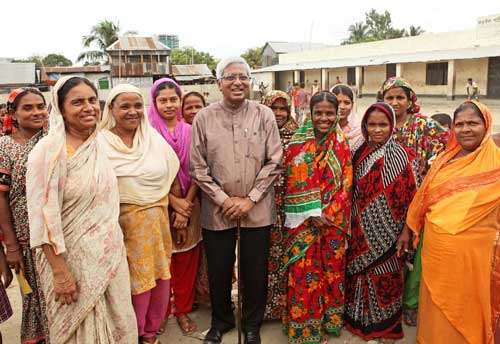
The roots of the World Food Prize
The World Food Prize was conceived in 1986 by Nobel Peace Prize recipient Norman Borlaug, an agronomist who grew up on a farm in Iowa. The father of the Green Revolution in the 1960s and 1970s, he crossbred thousands of wheat varieties, created “dwarf wheat” and developed a new agriculture technique that saved hundreds of millions of people from death and famine.
Recipients of the award have hailed from all over the world, including India, China, Cuba, Denmark, Sierra Leone, Brazil and Ethiopia, where Gebisa Ejeta brought drought-resistant sorghum to Africa. U.S. winners include food scientist Philip Nelson, who revolutionized bulk food transportation and storage.
Abed will receive the World Food Prize on October 15 in Des Moines, Iowa, during the Borlaug Dialogue, a three-day international symposium that attracts agriculture and development experts from more than 65 countries.
#GirlHero: The Story of Basemera From Uganda
A girl from Uganda has made it her mission to help other girls realise their potential
As world leaders shepherd in a new era of international development with the UN's Global Goals, Basemera, a young girl in rural Uganda dreams about her future and that of her friends and family.
Basemera comes from a Catholic family and is one of seven children. Her father is a primary school teacher and tried to earn enough to keep his kids in education, but didn't succeed; Basemera had to drop out of secondary school after only four years.
Yet she dreams big. Despite her challenging circumstances, she wants to start a business, so she can ensure that the next generation is fed and educated. She knows first-hand that food and schooling aren't a given for girls. And she is determined to change things.
Life-changing moment
Basemera is a leader, a dreamer, a change maker. But that wasn't always the case. Once, she was resigned to living in the kitchen and worrying about her prospects and those of her brothers and sisters with no solutions, no course of action. Life was bleak, the future uninspiring.
Then Basemera met Rosemary Akello. Rosemary works for BRAC, an organisation dedicated to bringing financial inclusion and economic empowerment to vulnerable populations. In her words, "It's important to invest in girls, because even if men build houses, women will always build homes."
That's why Rosemary runs financial inclusion and economic empowerment programmes, such as Goal, across 156 villages in Uganda, She knows firsthand that financial inclusion will ensure girls stay in school, keep them from early and forced marriages, and grant them the opportunity to determine their own future.
Feeling empowered
Basemera joined the Goal programme and her world opened up. She learned about her human rights; she learned about her body; she learned about effective communication, and she learned that she matters. Perhaps most importantly, she learned that she had options. She could be financially independent if she had the right tools, capabilities and resources.
Rosemary taught Basemera how to budget, save and plan her family finances. Basemera became financially literate - a critical milestone to achieving financial inclusion. And because BRAC is a microfinance institution that provides microloans to poor and vulnerable individuals, Basemera learned about entrepreneurship. She discovered that she could start her own business and control her economic destiny. That was the game changer.
Empowering others
Now, Basemera is not only dreaming about her future business, but also mentoring and coaching other girls in her community. She is encouraging them to make informed personal and financial decisions; she is pushing them to pursue their ambitions; she is ushering in the new generation of girl entrepreneurs across Uganda.
Basemera wants every girl to have a goal, as well as the right tools to achieve them, such as financial education and access to finance. As the Global Goals are celebrated around the world this week, let's remember Rosemary and Basemera in Uganda. They prove that if we invest in girls and women, we will change the world.
Youth & women key seeds to grow agriculture, experts say
The potential for youth to multiply agricultural production globally is huge.
Increasingly, however, young people from rural areas see their futures in urban centers, rather than in the fields—spurring a global wave of urban youth migration.
“Often young people don’t want to be in agriculture because they don’t see opportunities in agriculture,” said Rekha Mehra, Senior Associate for Gender and Economic Equity at Creative Associates International, speaking at the 2015 Making Cents Youth Economic Opportunities Summit in Washington, D.C.
“For young men and women to have opportunities in agriculture, it is critical to grow agriculture,” she said, leading an Oct. 7 panel of experts on inclusion of youth, women and girls in agriculture value chains.
Roughly half of the world’s population is younger than age 30, with 9 out of 10 youth living in developing countries. And some 70 percent of the world’s poor live in rural areas, where farming is a major source of employment, according to the World Bank
Bringing youth back to the land
As youth migration to urban areas grows and population levels climb, the need to bring young people back to agriculture is also expanding.
“Farming is an aging business, and young people are getting away from farming,” said Joyjit Deb Roy, Senior Vice President of Programs at Winrock International.
Yet upon arrival to cities, said Deb Roy, many young people from rural areas are finding only low wage jobs and poor living conditions, or end up unemployed. “But we can reengage the youth and bring them back to the land,” said Deb Roy.
By working with young farmers and rural communities to improve agriculture value chains—through micro-lending, vocational education, training in better planting, harvesting and selling practices, land grants, mentorship through youth farming groups and more—development practitioners can help build compelling counter arguments to convince young urban migrants of the income-generating opportunities back home.
Making women visible
Young women farmers face unique challenges in maximizing their contributions to and income from agriculture.
While nearly 2 in 5 agricultural workers in developing countries are women, according to the U.N. Food and Agriculture Organization, many of them do not identify their own labor as a key part of the agriculture value chain.
“If you ask most women who you see out in the fields working, they will say ‘I am not a farmer,’” said Mehra.
And not only are women invisible to themselves as farmers, she said, but often they are overlooked in agricultural development—where their potential to generate income and enhance the agricultural value chain is immense.
From planting to marketing to selling, women and girls play a variety of roles along the agriculture value chain, often in surprising ways, said Mehra.
To maximize the income-generating opportunities for these women and their families, “we need to be sure that we’re looking at both women and men. If you don’t look, then you definitely won’t find them,” she said.
Planting seeds for the future
In order for the seeds of training and support to youth farmers to truly take root and reap benefits beyond the life of a given program, improvements to the agriculture value chain must be sustainable.
“If you do something without a sustainability component, you leave the beneficiaries vulnerable. Because they may not continue doing it if it is not sustainable,” said Esau Tugume, former Area Coordinator for the Agriculture Extension Program for BRAC International in Uganda.
In Uganda—where 78 percent of the population is under 30 and youth unemployment is 64 percent—sustainability in youth employment and agriculture is pivotal.
Working with young female farmers ages 15 to 30, the Agriculture Extension program provided access to better seeds and farmable land—something that is often not available to young women.
But to ensure long-term success, the women and girls received trainings in life skills, financial literacy, and vocational skills for better farming as well as ongoing peer mentorship through a local club, which Tugume said is one of the most critical components for lasting gains.
“These girls have been mentored and they are monitored by a leader,” he said, “So the beneficiary feels like she is part of the project. She owns it.”
Improving agricultural value chains and giving young men and women the tools and skills they need to grow their crops and their incomes is about more than boosting food production.
“We are all here to support young people in developing countries to lead hopeful and fulfilling lives,” said Mehra. “In doing so one of the most important things if giving them opportunities for meaningful work”
Nutritious food for a billion people
One in three people in the world is malnourished. Deficiencies in vitamins and minerals such as vitamin A, iron, and zinc can cause blindness, reduced IQ, vulnerability to disease, and even death. Biofortification—breeding new, more nutritious varieties of staple food crops to increase their micronutrient content—is one promising approach for combatting micronutrient malnutrition among vulnerable groups in many developing countries.
Thanks to the work of HarvestPlus and its partners, biofortified crops—namely vitamin A sweet potatoes, iron beans, and high zinc rice and wheat—are now being grown by farmers and consumed by millions of families every year in more than 30 countries throughout the world.
The program has an even more ambitious goal: to reach one billion people by 2030. Can it be done? How?
At a recent IFPRI policy seminar, a panel of experts from HarvestPlus as well as the research and NGO community discussed ways to scale up biofortification and ensure that nutrition remains a global priority.
- Mainstream it.
To reach one billion people, biofortified crops must be mainstreamed into the strategies and plans of a wide range of development organizations, governments, and companies. According to Howdy Bouis, Director at HarvestPlus, this process already is well underway: the World Bank, the International Fund for Agricultural Development, the UN World Food Programme, the African Union, international NGOs such as World Vision, national governments, and private seed companies all either are including or have plans to include biofortified crops into their programs. - Reach more urban people.
”If we want to reach a billion people, we also have to reach the urban population,” said Anne Marie Ball, HarvestPlus manager of partnerships in Africa. Some city supermarkets are already offering products made with biofortified crops, such as bread from orange sweet potato. “When mothers know that vitamin A is in the food, they make a choice. You want a better future for your children.” - Convince national policymakers.
Mahabub Hossain, an advisor at BRAC and a member of the Global Panel on Agriculture and Food Systems for Nutrition, emphasized the importance of getting national policymakers on board—particularly ministers of finance. “It’s more than an issue of nutrition,” he said, noting that messages that show the link between good nutrition and economic productivity are powerful. - Partner with private companies.
The panelists agreed that engaging the private sector is crucial to expanding biofortification’s reach. This, too, is already underway. Seed companies like Zamseed in Zambia and Nirmal Seed in India are now marketing and selling biofortified seeds. To scale up, HarvestPlus and their partners must get even more private sector partners on board, and bigger ones. - Create incentives and move demand.
Demand for biofortified crops is already high—but it could be even higher. If countries establish national biofortification policies, enacting laws to sell more nutritious varieties of seeds and crops, and if companies see the benefit in buying and processing these crops from farmers, that will go a long way toward spurring demand. Having the right economic incentive structures in place also will ensure current efforts to scale up biofortification won’t take a step backward. As Bonnie McClafferty, formerly with HarvestPlus, put it, “Farmers will move away from [vitamin A] maize if they can make more money on [traditional] rice.”
In his concluding remarks, IFPRI Director General Shenggen Fan reminded the audience not to forget the roles of trade and policy research. “These are policy issues,” he said. “Research on policy can identify successes and help us scale them up.”
All agreed that there is no one solution to malnutrition. “A diverse diet is where we want to be,” said Bouis. “We need all pieces of the puzzle, and agriculture has to be part of the solution.” The other pieces of the nutrition puzzle? Vitamin and mineral supplementation and commercial fortification.
Reaching one billion people at risk of hidden hunger with biofortified crops will represent a key step toward achieving the recently adopted UN Sustainable Development Goal of ending hunger and malnutrition by 2030.
BRAC receives global accolade for advancing rule of law

12 July 2013, Dhaka. BRAC, the global development organisation founded in Bangladesh in 1972, received the World Justice Project Rule of Law Award at the fourth World Justice Forum in The Hague, Netherlands. The Rule of Law Award recognises BRAC for its efforts to promote legal empowerment of the poor as a means to end poverty.
The World Justice Forum is a global gathering hosted by the World Justice Project, an organisation dedicated to advancing the rule of law worldwide. BRAC was awarded in the organisation category alongside Ms Shirin Ebadi, in the individual category, for her relentless struggle to uphold the rule of law in Iran. Faustina Pereira, director of BRAC’s human rights and legal services (HRLS) programme, accepted the award on behalf of BRAC.
She said, “This award recognises BRAC’s approach to a ‘whole person development’. This view underscores the need to go beyond economic development, and places it hand in hand with social and legal empowerment. This award is recognition of the hard and dedicated work of all BRAC’s grassroots workers, particularly its 12,000 barefoot lawyers, its hitherto unsung heroes.”
BRAC’s HRLS programme is the world’s largest nongovernmental legal services programme. Through a cadre of ‘barefoot lawyers’, it empowers the poor by informing them of their legal rights and delivering legal services to the doorsteps of millions. A version of the programme is also active in Sierra Leone.
This recognition comes soon after the awarding of BRAC’s founder, Sir Fazle Hasan Abed, of the Open Society Prize from Central European University, which was founded by the philanthropist George Soros. Soros and Abed have collaborated on advocacy and interventions to promote legal empowerment of the poor. “A legally empowered citizenry is both the guarantor and lifeblood of democracy,” Soros and Abed wrote in a jointly authored comment in Financial Times last year. “Poverty will only be defeated when the law works for everyone.”
Innovations in youth skill development
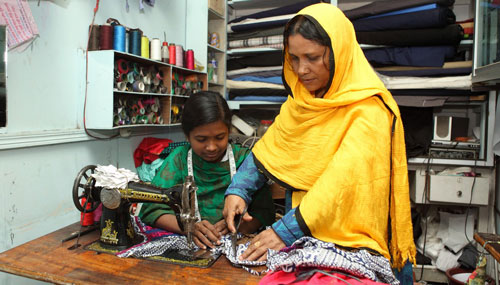
08 July 2013, Dhaka. A round table discussion on 'Innovations in skill development training for youth: effective planning and implementation’ was held on 7 July at Spectra Convention Centre organised by BRAC Education Programme. The discussion focused around understanding the achievements of the government’s and the NGOs so far, in the skills development training initiatives for the youth, and future prospects of scaling up.
Participants included representatives of Bureau of Non-formal education, national skill Development Council, ILO, FBCCI and concerned partners. S.M Ashraful Islam, Additional Secretary, Ministry of Primary and Mass education emphasised that “skills training should now be more focused on demand driven then supply driven”. He also mentions that overseas job opportunities should also be explored when speaking of skills development for the youth.
Jibon Kumar Chowdhury, CEO of National Skills Development Council, raised the concern of a lack of certified assessors in the country, who can efficiently validate the skills of development trainees in order to certifying them. NSDC is currently working on capacity building of assessors so that trainees could be certified through proper authority.
Dr Mahabub Hossain says, “according to the projected population dividend, youth will be more dominating in our population. Without proper skill development training we cannot expect to have an efficient workforce which would help the country to become one of the middle income countries by 2021”.
So far BRAC’s Skills Training for Advancing Resources (STAR) initiative, in partnership with GoB, ILO and UNICEF, worked with 1000 youths in the first phase, of whom 992 have successfully completed their respective skills training and of them 968 have been placed in proper jobs. STAR now is at its second phase and hopes to cover 3000 and more youths, with the support of the government and BRAC’s self initiatives, by the end of 2016.
More...
Join the world’s biggest family




